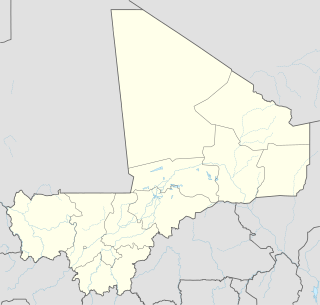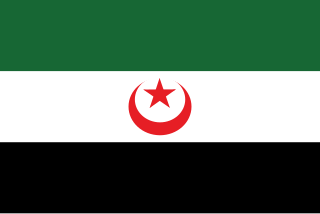The Tuareg people are a large Berber ethnic confederation. They principally inhabit the Sahara in a vast area stretching from far southwestern Libya to southern Algeria, Niger, Mali and Burkina Faso. Traditionally nomadic pastoralists, small groups of Tuareg are also found in northern Nigeria.

Tuareg, also known as Tamasheq, Tamajaq or Tamahaq, is a language or family of very closely related Berber languages and dialects. It is spoken by the Tuareg Berbers in large parts of Mali, Niger, Algeria, Libya and Burkina Faso, with a few speakers, the Kinnin, in Chad.
The music of Niger has developed from the musical traditions of a mix of ethnic groups; Hausa, the Zarma Songhai people, Tuareg, Fula Kanuri, Toubou, Diffa Arabs and Gurma and the Boudouma from Lac Chad.

Agadez, formerly spelled Agadès, is the 5th largest city in Niger, with a population of 110,497. The capital of Agadez Region, it lies in the Sahara desert, and is also the capital of Aïr, one of the traditional Tuareg–Berber federations. The historic centre of the town has been designated a World Heritage Site by UNESCO.

The Volkswagen Touareg is a mid-size luxury SUV produced by German automaker Volkswagen since 2002 at the Volkswagen Bratislava Plant. The vehicle was named after the nomadic Tuareg people, inhabitants of the Saharan interior in North Africa.

From 1990 to 1995, a rebellion by various Tuareg groups took place in Niger and Mali, with the aim of achieving autonomy or forming their own nation-state. The insurgency occurred in a period following the regional famine of the 1980s and subsequent refugee crisis, and a time of generalised political repression and crisis in both nations. The conflict is one in a series of Tuareg-based insurgencies in the colonial and post-colonial history of these nations. In Niger, it is also referred to as the Second or Third Tuareg Rebellion, a reference to the pre-independence rebellions of Ag Mohammed Wau Teguidda Kaocen of the Aïr Mountains in 1914 and the rising of Firhoun of Ikazkazan in 1911, who reappeared in Mali in 1916. In fact the nomadic Tuareg confederations have come into sporadic conflict with the sedentary communities of the region ever since they migrated from the Maghreb between the 7th and 14th centuries CE. Some Tuareg wished for an independent Tuareg Nation to be formed when French Colonialism ended. This combined with dissatisfaction over the new governments led some Tuareg in Northern Mali to rebel in 1963.

The Iwellemmedan (Iwəlləmədǎn), also spelled Iullemmeden, Aulliminden, Ouilliminden, Lullemmeden, and Iwellemmeden, are one of the seven major Tuareg tribal or clan confederations. Their communities are historically nomadic and intermixed with other ethnic groups. The Iwellemmeden inhabit a wide area ranging from east and north central Mali, through the Azawagh valley, into northwestern Niger and south into northern Nigeria. While once a single confederation of dozens of Tuareg clans, subject peoples, and allied groups, since the 18th century they have been divided into Kel Ataram (west) and Kel Dinnik (east) confederations. Following colonial rule and independence, the Iwellemmedan homelands cross the Mali/Niger border, and their traditional seasonal migration routes have spread Iwellemmedan communities into Burkina Faso and Nigeria as well. They speak the Tawellemmet variant of the Tamasheq language, although some current or historical sub-clans speak other Tamasheq variants as well as Songhai languages and Arabic dialects.
Souéloum Diagho, the contemporary Tuareg poet, comes from Tessalit in the North of Mali. His father is a Tuareg and his mother a Fula. He is married and lived for a time in Belgium. He is author and editor of the 2001 work Poésies touareg : le chant des saisons, a collection of some 175 traditional poems.
Kel Ayr was a semi-nomadic Tuareg tribal confederation. It ruled an area centered on the Aïr Mountains in what is today Niger.

The Tuareg Rebellion of 2007–2009 was an insurgency that began in February 2007 amongst elements of the Tuareg people living in the Sahara desert regions of northern Mali and Niger. It is one of a series of insurgencies by formerly nomadic Tuareg populations, which had last appeared in the mid-1990s, and date back at least to 1916. Populations dispersed to Algeria and Libya, as well as to the south of Niger and Mali in the 1990s returned only in the late 1990s. Former fighters were to be integrated into national militaries, but the process has been slow and caused increased resentment. Malian Tuaregs had conducted some raids in 2005–2006, which ended in a renewed peace agreement. Fighting in both nations was carried on largely in parallel, but not in concert. While fighting was mostly confined to guerrilla attacks and army counterattacks, large portions of the desert north of each nation were no-go zones for the military and civilians fled to regional capitals like Kidal, Mali and Agadez, Niger. Fighting was largely contained within Mali's Kidal Region and Niger's Agadez Region. Algeria helped negotiate an August 2008 Malian peace deal, which was broken by a rebel faction in December, crushed by the Malian military and wholescale defections of rebels to the government. Niger saw heavy fighting and disruption of Uranium production in the mountainous north, before a Libyan backed peace deal, aided by a factional split among the rebels, brought a negotiated ceasefire and amnesty in May 2009.

The Kaocen revolt was a Tuareg rebellion against French colonial rule of the area around the Aïr Mountains of northern Niger during 1916–17.
Tetserret is a Western Berber language spoken by the Ait-Awari and Kel Eghlal Tuareg tribes of the Akoubounou (Akabinu) commune in Niger. This main speech area is located between Abalak, Akoubounou and Shadwanka. The variant spoken by the Kel Eghlal is called taməsəɣlalt. The Tamasheq equivalent shin-sart / shin-sar / tin-sar is used in some older literature. Popular understanding among some Ait-Awari derives the name tet-serret, and its Tamasheq equivalent shin-sart, from expressions meaning 'the (language) of Sirte'.
The Kel Owey are a Tuareg clan confederation. From the 18th century until the advent of French colonial rule at the beginning of the 20th century, they were a dominant power in the Aïr Mountains of north central Niger.

Douentza is a town and urban commune in the Mopti Region of central Mali. The town lies 145 km east-northeast of Mopti on the RN16, a paved road that links Mopti and Gao. It is the administrative center of the Douentza Cercle.
The May 23, 2006 Democratic Alliance for Change is a Malian Tuareg rebel group, formed in 2006 by ex-combatants from the 1990s Tuareg insurgency in Mali. In 2007, splinters of the organisation returned to combat in northern Mali, launching the Malian element of the 2007 Tuareg insurgency. Led by Ibrahim Ag Bahanga, this ADC faction continued to operate under that name, despite most elements remaining under ceasefire. In July 2008, most of these elements, along with much of the splinter following Ag Bahanga reached another accord with the Malian government in Algiers. Ag Bahanga and a faction of that group rejected the accord and fled to Libya. At the end of 2008, this faction returned to fighting, operating under the name Alliance Touaregue Nord Mali Pour Le Changement (ATNMC). The government of Mali has contended since 2007 that the Ag Bahanga faction of the ADC is a "band of marginals" who were "isolated from the heart of the Tuareg community", primarily motivated by lucrative Trans-Saharan smuggling operations operating from Ag Bahanga's home town of Tin-Zaouatene. Ag Bahanga and the other leaders of his faction contend that the government of Mali oppresses the Tuareg population of the north, and has repeatedly failed to live up to its agreements with the ADC and other groups. Outside observers have also speculated that internal rivalries between Tuareg from the Kel Adagh and the Ouilliminden confederations have frustrated peace attempts.

Bankilaré is a village and rural commune in Niger. Bankilaré commune, centered on the town of the same name, is in Téra Department, Tillabéri Region, in the northwestern corner of the country. The town lies 60 km north of Departmental capital Téra, and around the same distance from the Burkina Faso border and the Mali border.
The Dawsahak people, Idaksahak are pastoralist Berbers centered on Menaka and Inékar town in Menaka Cercle and Talataye in Ansongo Cercle of the Gao Region of northeastern Mali. They speak the Northern Songhai language Tadaksahak. Many also speak Western Tawallammat Tamajaq language, the Tuareg language of southern Gao. Daoussahak appears to be the most common transliteration of the collective name among French and English academics.

The Battle of Khalil took place on 22–23 February 2013 and was part of the Northern Mali conflict, the battle began on the 22nd with two suicide bombings.

The Arab Movement of Azawad is an Arab military organization active in Azawad/northern Mali. Initially known as the National Liberation Front of Azawad, it was formed in early 2012, during the 2012 Tuareg rebellion. The MAA claims to be a secular, non-terrorist organization, whose main objective is to defend the interests of the Arab peoples of northern Mali. It is reportedly willing to "work with France against terrorism, drug trafficking and organized crime" in the region. The group calls for granting substantial autonomy to northern Mali.

The Volkswagen Tharu is a compact CUV produced by the German automobile manufacturer Volkswagen. The vehicle is positioned above T-Cross and below Tiguan Allspace, sharing the position, but not marketed, with the T-Roc or the Tiguan.










